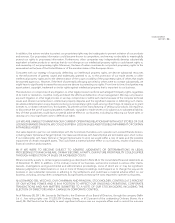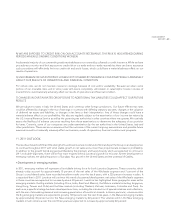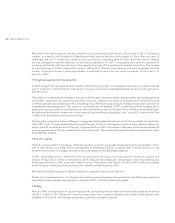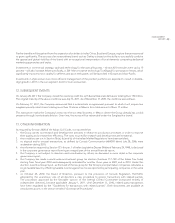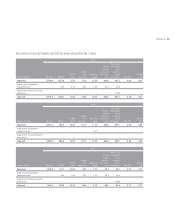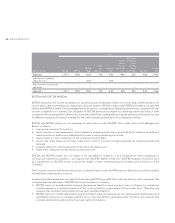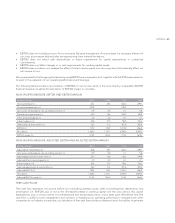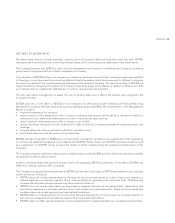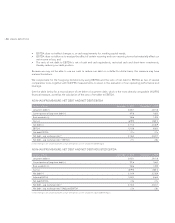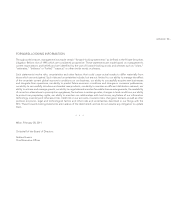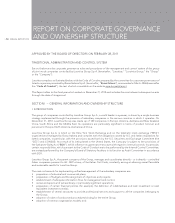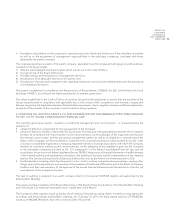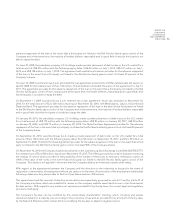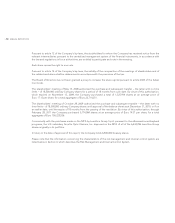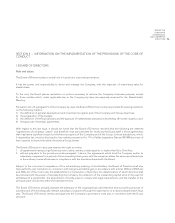LensCrafters 2010 Annual Report Download - page 71
Download and view the complete annual report
Please find page 71 of the 2010 LensCrafters annual report below. You can navigate through the pages in the report by either clicking on the pages listed below, or by using the keyword search tool below to find specific information within the annual report.APPENDIX | 69 >
NET DEBT TO EBITDA RATIO
Net debt means the sum of bank overdrafts, current portion of long–term debt and long–term debt, less cash. EBITDA
represents net income before non–controlling interest, taxes, other income/expense, depreciation and amortization.
The Company believes that EBITDA is useful to both management and investors in evaluating the Company’s operating
performance compared with that of other companies in its industry.
Our calculation of EBITDA allows us to compare our operating results with those of other companies without giving effect
to financing, income taxes and the accounting effects of capital spending, which items may vary for different companies
for reasons unrelated to the overall operating performance of a company’s business. The ratio of net debt to EBITDA is a
measure used by management to assess the Company’s level of leverage, which affects our ability to refinance our debt
as it matures and incur additional indebtedness to invest in new business opportunities.
The ratio also allows management to assess the cost of existing debt since it affects the interest rates charged by the
Company’s lenders.
EBITDA and ratio of net debt to EBITDA are not measures of performance under International Financial Reporting
Standards as issued by the International Accounting Standards Board (IAS/IFRS). We include them in this Management
Report in order to:
improve transparency for investors;•
assist investors in their assessment of the Company’s operating performance and its ability to refinance its debt as it •
matures and incur additional indebtedness to invest in new business opportunities;
assist investors in their assessment of the Company’s cost of debt;•
ensure that these measures are fully understood in light of how the Company evaluates its operating results and •
leverage;
properly define the metrics used and confirm their calculation; and•
share these measures with all investors at the same time.•
EBITDA and ratio of net debt to EBITDA are not meant to be considered in isolation or as a substitute for items appearing
on our financial statements prepared in accordance with IAS/IFRS. Rather, these non–IAS/IFRS measures should be used
as a supplement to IAS/IFRS results to assist the reader in better understanding the operational performance of the
Company.
The Company cautions that these measures are not defined terms under IAS/IFRS and their definitions should be carefully
reviewed and understood by investors.
Investors should be aware that Luxottica Group’s method of calculating EBITDA and the ratio of net debt to EBITDA may
differ from methods used by other companies.
The Company recognizes that the usefulness of EBITDA and the ratio of net debt to EBITDA as evaluative tools may have
certain limitations, including:
EBITDA does not include interest expense. Because we have borrowed money in order to finance our operations, •
interest expense is a necessary element of our costs and ability to generate profits and cash flows. Therefore, any
measure that excludes interest expense may have material limitations;
EBITDA does not include depreciation and amortization expense. Because we use capital assets, depreciation and •
amortization expense is a necessary element of our costs and ability to generate profits. Therefore, any measure that
excludes depreciation and expense may have material limitations;
EBITDA does not include provision for income taxes. Because the payment of income taxes is a necessary element of •
our costs, any measure that excludes tax expense may have material limitations;
EBITDA does not reflect cash expenditures or future requirements for capital expenditures or contractual commitments;•


